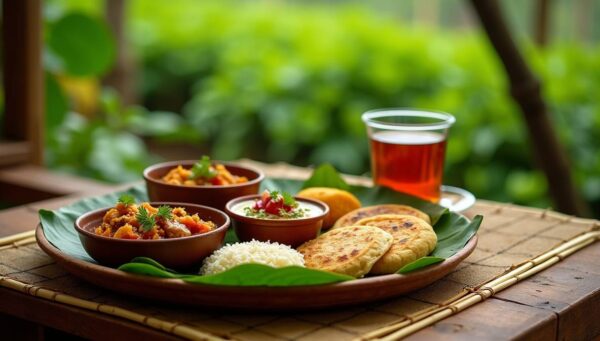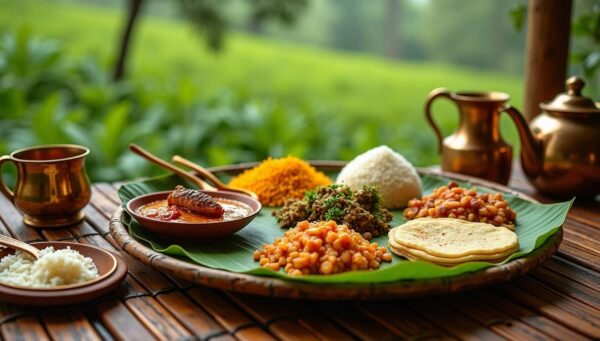Assamese cuisine is a vibrant reflection of Northeast India’s cultural and geographical diversity. Rooted in the region’s agrarian and fishing traditions, it uses local ingredients like rice, fish, meat, and vegetables, prepared with simple techniques to preserve their natural flavors. Unlike many Indian cuisines, Assamese food is less spicy, relying on herbs and aromatic spices for its distinctive taste. This article explores the best traditional foods of Assam, from breakfast snacks to hearty main courses, sweets, and drinks, offering a comprehensive guide to this unique culinary tradition.
Traditional Snacks and Breakfast
Assamese breakfasts are light yet satisfying, often centered around Jolpan, a collection of snacks and sweets served with Assam tea. These dishes are quick to prepare, nutritious, and deeply ingrained in Assamese culture, especially during festivals like Bihu.
| Dish | Description | Key Ingredients | Preparation Notes |
|---|---|---|---|
| Jolpan | A traditional breakfast of assorted snacks and sweets, paired with Assam tea. | Chira, Muri, Pitha, Ladoo, jaggery, milk | Varies by region, served as a light meal. |
| Chira | Flaked rice, light and crispy, often soaked for softness. | Flaked rice, jaggery, milk, curd | Soaked in water, served with sweeteners. |
| Muri | Puffed rice, a crunchy snack enjoyed with tea or as a mix. | Puffed rice, milk, sugar, peanuts, spices | Eaten plain or mixed with savory/sweet add-ons. |
| Pithaguri | Savory, crunchy snack made from roasted and crushed rice. | Rice, cumin, coriander, turmeric, salt | Roasted rice crushed and mixed with spices. |
| Suji | Versatile semolina used in sweet or savory dishes. | Semolina, ghee, sugar, vegetables, spices | Used in halwa (sweet) or upma (savory). |
- Jolpan: This breakfast staple includes a variety of items like Chira, Muri, and different types of Pitha. It’s often served during special occasions like weddings or Bihu, making it a cultural cornerstone. Learn more about Assam’s cultural heritage at Birth Caste System Assam.
- Chira: Made by parboiling, flattening, and drying rice, Chira is a low-fat, high-carb option that’s easy to digest. It’s commonly paired with curd or jaggery.
- Muri: This puffed rice is a popular tea-time snack, especially during the monsoon season. It can be mixed with peanuts, onions, or spices for a savory twist.
- Pithaguri: Roasted rice is crushed into a powder and mixed with spices, creating a crunchy snack perfect for pairing with tea.
- Suji: Used in dishes like Suji ka Halwa (a sweet dessert with ghee and cardamom) or Upma (a savory dish with vegetables), Suji is a versatile ingredient in Assamese kitchens.
Rice Varieties

Rice is the backbone of Assamese cuisine, with unique varieties that add flavor and nutrition to both savory and sweet dishes.
| Rice Variety | Description | Key Nutrients | Common Uses |
|---|---|---|---|
| Bora Saul | Black rice with a nutty flavor, a traditional staple. | Antioxidants, iron, magnesium, fiber | Pitha, pulao, kheer |
| Komal Saul | White rice with a sweet, fluffy texture. | Carbohydrates, fiber, protein, thiamin | Steamed rice, pulao, kheer |
| Koni-dhan | Black aromatic glutinous rice with a floral aroma. | Antioxidants, fiber, iron, zinc | Festive Pitha, desserts |
| Sunga Saul | Barnyard millet, gluten-free with a nutty flavor. | Protein, fiber, vitamins, minerals | Porridge, cakes, bread |
- Bora Saul: Known for its dark color and health benefits, this black rice is used in dishes like Pitha and kheer. Its antioxidant properties make it a great addition to a healthy diet, as discussed in Benefits of Plant-Based Foods.
- Komal Saul: This white rice is a staple in Assamese households, often served steamed or in desserts. Its soft texture makes it ideal for various preparations.
- Koni-dhan: Grown organically by small-scale farmers, this aromatic rice is a festive favorite, used in Pitha and other special dishes.
- Sunga Saul: This millet is soaked, mixed with coconut milk, and roasted in bamboo tubes, creating a unique dish served with curd or jaggery.
Main Courses
Assamese main courses are hearty, often featuring fish, meat, or vegetables cooked with local spices and herbs.
| Dish | Description | Key Ingredients | Preparation Notes |
|---|---|---|---|
| Masor Tenga | Sour fish curry, light and refreshing, a summer staple. | Fish, tomatoes, outenga, lemon, mustard oil | Fried or stewed with souring agents. |
| Duck Meat Curry | Rich curry for special occasions, often with ash gourd. | Duck, ash gourd, black pepper, spices | Slow-cooked with whole spices. |
| Khar Dishes | Alkaline dishes made with banana peel ash, aids digestion. | Banana ash, raw papaya, pulses, fish | Filtered through banana leaves, cooked with various ingredients. |
| Poita Bhaat | Fermented rice, tangy and cooling, popular in summer. | Rice, mustard oil, onion, chili, pickles | Soaked overnight, served with accompaniments. |
| Pitika | Mashed grilled foods, served as side dishes. | Potatoes, fish, mustard oil, green chilies | Grilled, mashed, garnished with oil and spices. |
| Assamese Fish Thali | A platter of various fish preparations. | Fish, ridge gourd, tomato, khorisa, bhoot jolokia | Includes curries, fries, and boiled dishes. |
| Pork with Bamboo-Shoot | Smoked pork with fermented bamboo shoot, tribal favorite. | Pork, bamboo shoot, tomato, ghost chili | Boiled with tangy ingredients. |
- Masor Tenga: This tangy fish curry is a staple, often made with Goroi fish and souring agents like elephant apple. It’s perfect with steamed rice.
- Duck Meat Curry: A special-occasion dish, it’s cooked with aromatic spices and ash gourd, offering a rich flavor. For more on poultry, check Poultry Farming Basics.
- Khar Dishes: Made with kola khar (banana ash), these dishes are unique to Assam and believed to aid digestion. They can include fish, vegetables, or pulses.
- Poita Bhaat: Fermented rice is soaked overnight and served with mustard oil and pickles, sometimes with a slight alcoholic twist.
- Pitika: Mashed dishes like Aloo Pitika or Pura Maas Pitika are flavorful sides, often garnished with mustard oil and chilies.
- Assamese Fish Thali: This platter showcases Assam’s love for fish, with curries, fries, and boiled preparations using local ingredients like khorisa.
- Pork with Bamboo-Shoot: A tribal delicacy, this dish combines smoked pork with fermented bamboo shoot for a smoky, tangy flavor. Learn about pig farming at Pig Farming in India.
Sweets and Desserts

Assamese sweets are a highlight, often made with rice, coconut, sesame, and jaggery, especially during festivals like Bihu.
| Dish | Description | Key Ingredients | Preparation Notes |
|---|---|---|---|
| Pitha | Rice cakes, sweet or savory, made for festivals. | Rice flour, coconut, jaggery, sesame, lentils | Steamed, fried, or baked in various forms. |
| Til Pitha | Sesame-stuffed rice cakes, crispy and sweet. | Rice flour, sesame seeds, jaggery | Fried until golden brown. |
| Ghila Pitha | Soft pancakes with a sweet filling. | Rice flour, jaggery, coconut | Cooked on a griddle, spread thin. |
| Sunga Pitha | Rice cakes cooked in bamboo tubes, aromatic. | Rice flour, coconut, jaggery, bamboo | Steamed in bamboo, served with milk. |
| Uhuwa Pitha | Savory rice cakes with black gram lentils. | Black gram lentils, rice, salt | Steamed in molds, served warm. |
| Tekeli Pitha | Rice cakes cooked in an earthenware pot. | Rice flour, coconut, sugar, cardamom | Steamed in a tekeli pot over a fire. |
| Ladoo | Sweet balls, popular during festivals. | Rice flour, coconut, jaggery, sesame, ghee | Rolled into balls, often fried or toasted. |
- Pitha: These rice cakes come in many forms, from sweet Til Pitha to savory Uhuwa Pitha. They’re a festival staple, especially during Bhogali Bihu.
- Til Pitha: Made with sesame seeds and jaggery, these are fried to a crispy texture.
- Ghila Pitha: These soft pancakes are made with rice flour, jaggery, and coconut, perfect as a snack or dessert.
- Sunga Pitha: Cooked in bamboo tubes, these cakes have a unique aroma and are served with hot milk.
- Uhuwa Pitha: A savory option made with black gram lentils, steamed and served with tea.
- Tekeli Pitha: Cooked in an earthenware pot, this dessert combines rice flour, coconut, and cardamom for a rustic flavor.
- Ladoo: Includes Narikol Ladoo (coconut-based) and Tilor Laru (sesame-based), both popular during festivals and religious ceremonies.
Traditional Drinks
Drinks in Assam complement the cuisine, with Assam Tea being the most famous.
| Drink | Description | Key Ingredients | Occasion |
|---|---|---|---|
| Assam Tea | Bold, malty black tea, a global favorite. | Camellia sinensis leaves | Daily, breakfast, tea time |
| Xaj Pani | Rice beer, mildly alcoholic, popular in rural areas. | Fermented rice | Festivals, special occasions |
| Aapong | Sweet rice wine, served at celebrations. | Rice, jaggery | Weddings, celebrations |
| Pitha Pani | Refreshing drink made by soaking Pitha in water. | Pitha, water | Light refreshment |
| Bel Pani | Cooling drink made from bel fruit pulp. | Bel fruit, sugar, water | Hot days, refreshment |
| Kaji Nemu | Tangy lemon drink, refreshing and light. | Kaji lemon, sugar, water | Daily, hot weather |
- Assam Tea: Grown in Assam’s lush tea gardens, this black tea is known for its robust flavor. It’s a staple in households worldwide, often enjoyed with milk and sugar. Discover more about Assam’s contributions at Axiom Space.
- Xaj Pani: A traditional rice beer, it’s a festive drink in rural Assam.
- Aapong: This sweet rice wine is a celebratory drink, often served at weddings.
- Pitha Pani: Soaked Pitha creates a nourishing, light drink.
- Bel Pani: Made from bel fruit, this drink is cooling and refreshing.
- Kaji Nemu: A tangy lemon drink made from kaji lemons, perfect for hot days.
Unique and Tribal Dishes
Assam’s tribal communities contribute unique dishes that add depth to the cuisine.
| Dish | Description | Key Ingredients | Preparation Notes |
|---|---|---|---|
| Silk Worm | Stir-fried delicacy, crunchy outside, soft inside. | Silk worm pupae, spices | Boiled, then stir-fried with spices. |
| Pani Hamuk | Water snails boiled with pumpkin, collected from paddy fields. | Water snails, pumpkin | Boiled together, simple preparation. |
| Kangthu | Karbi dish of veggies, meat, or fish wrapped in leaves, smoked or baked. | Fish, vegetables, banana/turmeric leaves | Wrapped and smoked or baked. |
- Silk Worm: A tribal delicacy, silk worms are stir-fried after silk extraction, offering a unique texture and flavor.
- Pani Hamuk: Water snails from paddy fields are boiled with pumpkin, creating a simple yet flavorful dish.
- Kangthu: This Karbi dish involves wrapping ingredients in banana or turmeric leaves and smoking or baking them, resulting in a healthy, aromatic meal.
Exploring Assamese Cuisine Further
Assamese cuisine is a testament to the region’s rich heritage, blending simplicity with bold flavors. Whether you’re savoring a plate of Jolpan with Assam Tea, enjoying a tangy Masor Tenga, or indulging in a sweet Til Pitha, each dish offers a glimpse into Assam’s culture. For food enthusiasts, trying these dishes at an authentic Assamese restaurant or during a visit to Assam is a must. To explore more about healthy eating, check 40 Powerful Fat-Burning Superfoods.







